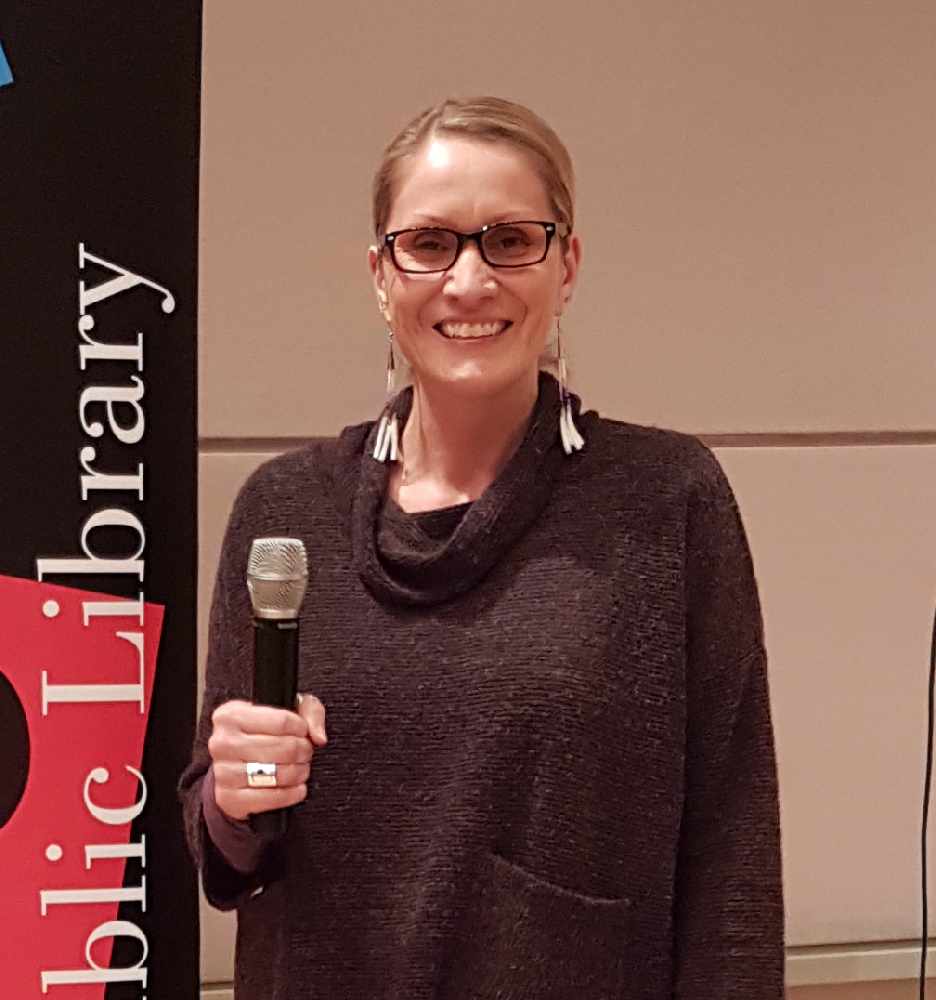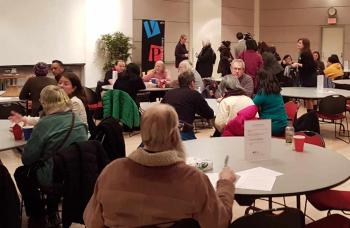By Andrea Smith
Windspeaker.com Contributor
There seemed to be little appetite for a discussion about reconciliation in downtown Vancouver last night with only about 40 people turning out for Let’s Talk About Reconciliation.
Vancouver was the first stop in a national series of talks and film screenings meant to spark a larger conversation about reconciliation across Canada. The series is set to criss-cross the country over the next three years hosted in various public libraries.
Inside the VPL, both Indigenous and non-Indigenous people sat at small tables, the point of which was to bring both worlds together.
Jules Koostachin curated the event, but as the evening kicked off she said she was feeling less than hopeful about the future of reconciliation due to the recent verdict in the fatal Colton Boushie shooting trial.

Jules Koostachin
“You know, I think it’s a really turbulent time right now. We’re talking about reconciliation, but this was before the verdict… Things are really raw, emotionally and spiritually and mentally. We’re treading carefully and I’m trying to be respectful, and I’m trying to be respectful of myself, because I don’t want to break down,” she said.
“Five years ago, when you’d talk about reconciliation, at least for me and my family, there was hope. We were actually seeing improvements… Things were starting to happen. Then this just took us 10 steps back,” she said.
Koostachin agreed to her role in Let’s Talk before the Gerald Stanley trial decision. Since then, she has been wondering about the implications of it.
“Does this even mean we’re safe?” she said, adding that she was afraid how she would react to the films and to the discussion afterward.
“In terms of hope, I hope people come here with open hearts and open minds. I think what’s important is being an active listener… not shutting us down, or speaking for us. You know, to actually watch the films, and open their hearts to the stories,” she said.
The Let’s Talk event is the result of a partnership between the National Film Board of Canada, the Canadian Commission of UNESCO, the Truth and Reconciliation Commission, the Canadian Federation of Library Associations, and the Library and Archives of Canada.
Koostachin chose all her films from the NFB’s collection. Cease Wyss, a Vancouver-based media artist, educator, and Indigenous Plant Diva—the actual name of a film made about her, also on Koostachin’s list for the evening—offered a blessing and a traditional drum song before the films began. The film shown about her that evening demonstrated her deep knowledge about traditional plant medicine.
A representative for UNESCO spoke, as well. Then Koostachin gave a short speech before playing the films. Over the course of an hour-and-a-half the following films rolled out: The Ballad of Crowfoot, directed by Willie Dunn; Honoring our Elders and Life Givers, directed by Janine Windolph; Smudge, directed by Gail Maurice; Writing the Land, directed by Kevin Lee Burton; Button Blanket, directed by Zoe L. Hopkins; Indigenous Plant Diva, directed by Kamala Todd; Wave a Red Flag, directed by Adam Garnet Jones; Ballads Not Bullets, directed by Marie Humber Clements; Etlinisigu’niet (Bleed Down), directed by Jeff Barnaby; Breaths, directed by Nyla Innuksuk; Two Spirit, directed by Sharon Desjarlais; and finally, Hipster Headdress, directed Amanda Strong.
After all the films ended, each table was given two questions to ponder, questions such as: What would be a concrete example of an action an individual can take toward reconciliation? And: What impacts did residential schools have on Indigenous peoples and communities?
They were given 20 minutes to discuss, and the answers were shared with the rest of the audience in the room.
“We just chatted a bit about reconciliation the whole time. We talked about how it feels a bit like Alberta is trying to colonize B.C. all over again,” one voice said, a comment that missed the mark on the reconciliation concept entirely.
An angry man said, “It’s degrading when someone calls me Chief. Because I’m not a leader… I don’t like that,” to which Koostachin agreed.
“Our question was ‘What does reconcilation mean to you?’’ said Cease Wyss, speaking on behalf of her table.
“It means being able to reinstate our cultural and spiritual lives... We can never leave our cultural selves behind. Our past helps us take care of our future,” she added.
Another voice said “Someone from Columbia at our table only became aware of reconciliation after coming here. And I’ve seen a lot of programs on it. We can educate ourselves, reading books like Wab Kinew’s “The Reason I Walk”. We also talked about the frustration in getting the government to change course.”
The most disheartening answer that came from the night was to the question of What will reconciliation look like in 10 years? The group’s answer was on par with Koostachin’s general feelings during the night.
“We wanted to be hopeful… but we weren’t able to be. We talked about the Stanley case, and other cases like it. And we said it seems like these have been going on for 100 years. So, what’s really going to happen in 10?” said the man.
While no one left feeling optimistic, the goal of the meeting was reached, according to the UNESCO public affairs senior advisor Angele Cyr. The event was just to open up dialogue between people.
“One of the ideas was to help create safe spaces where people can have conversations and talk about reconciliation. I hope some friendships will start… Maybe not, but at least we start the conversation to get Indigenous and non-Indigenous people together to talk about whatever they want to discuss,” she said.

